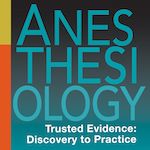 Anesthesiologists
Anesthesiologists
Ketamine, other anesthetics show promise for depression, mental health treatment

Editor's Note The advance of ketamine and other anesthetics as depression treatments is spurring collaboration among anesthesiologists and psychiatrists for further advances in mental health treatment, according to an article in the June issue of Anesthesiology, the peer-reviewed journal of the American Society of Anesthesiologists. As the established experts in…
Carbon-conscious health systems phase out desflurane anesthesia gas to reduce emissions

Editor's Note Citing environmental concerns, multiple health systems have stopped using desflurane anesthesia gas, Becker’s Hospital Review reported on May 7. Citing the Philadelphia Inquirer, the outlet notes that Children's Hospital of Philadelphia and Marlton, N.J.-based Virtua Health are among those that have eliminated the gas so far, with the…
Study: Surgical team diversity improves patient outcomes

Editor's Note The more diverse the surgical team, the better the outcomes for patients and the lower the cost of care, according to a study of more than 700,000 operations at 88 hospitals in Ontario, Canada. Published May 15 in the British Journal of Surgery, findings show that surgeon-anesthetist teams…
Study: Standard preoperative fasting instructions sufficient for diabetic patients

Editor's Note Recent research suggests that minimizing the risk of perioperative pulmonary aspiration in diabetic patients does not require different fasting instructions. However, at least one expert has questioned the results, and widespread glucagon-like peptide-1 (GLP-1) receptor agonists for the treatment of both type 2 diabetes and weight loss can…
Data cast doubt on recommendation to delay weight-loss meds prior to surgery

Editor's Note A recent analysis of insurance claims data suggests weight-loss medications like Ozempic (semaglutide), Trulicity (dulaglutide), and other glucagon-like peptide-1 (GLP-1) receptor agonists do not increase risks associated with undergoing anesthesia. As reported April 22 in MedPage Today, these finding that contradicts a June 2023 recommendation from the American Society of…
Propofol anesthesia for colonoscopy could help find polyps, prevent cancer

Editor's Note By putting the patient into deeper sedation during colonoscopy, propofol could help doctors find difficult-to-spot, potentially cancerous “serrated” polyps, according to a study published April 17 in Anesthesiology. As an alternative to moderate, “conscious” sedation, propofol facilitates a more thorough exam that is more likely to identify serrated…
Anesthesiologists push to improve pain control during caesarean delivery

Editor's Note A letter to the editor published April 10 in Anesthesiology, the official publication of the American Society of Anesthesiologists (ASA), calls attention to an official statement outlining best practices for ensuring all moms-to-be receive adequate pain management during planned or unexpected C-sections. The best practices are outlined in…
ASA annual meeting highlights top 10 risks of providing anesthesia in ambulatory setting

Editor's Note There are certain patients and clinical situations that may require anesthesiologists to say no to performing surgery in the outpatient/ambulatory setting, Anesthesiology News April 4 reports. At the 2023 annual meeting of the American Society of Anesthesiologists (ASA), BobbieJean Sweitzer, MD, a professor of medical education at the…
Study: Propofol sedation increases colonoscopy costs without improving outcomes

Editor's Note Although the use of propofol for colonoscopy has been rising due to beliefs that deep sedation leads to greater patient comfort, a recent systematic review and meta-analysis of nearly 1,500 patients from nine randomized controlled trials shows this view is not supported by available evidence. Published March 8…
Study: Weight loss drugs could increase risk of surgical complications

Editor's Note Popular weight-loss drugs like Ozempic and Mounjaro could lead to complications in surgical procedures, according to study published March 6 in the journal JAMA Surgery. The study focused on drugs known as glucagon-like peptide-1 receptor agonists (GLP-1 RAs) which are used to treat diabetes and obesity. The drugs, which…

 Free Daily News
Free Daily News